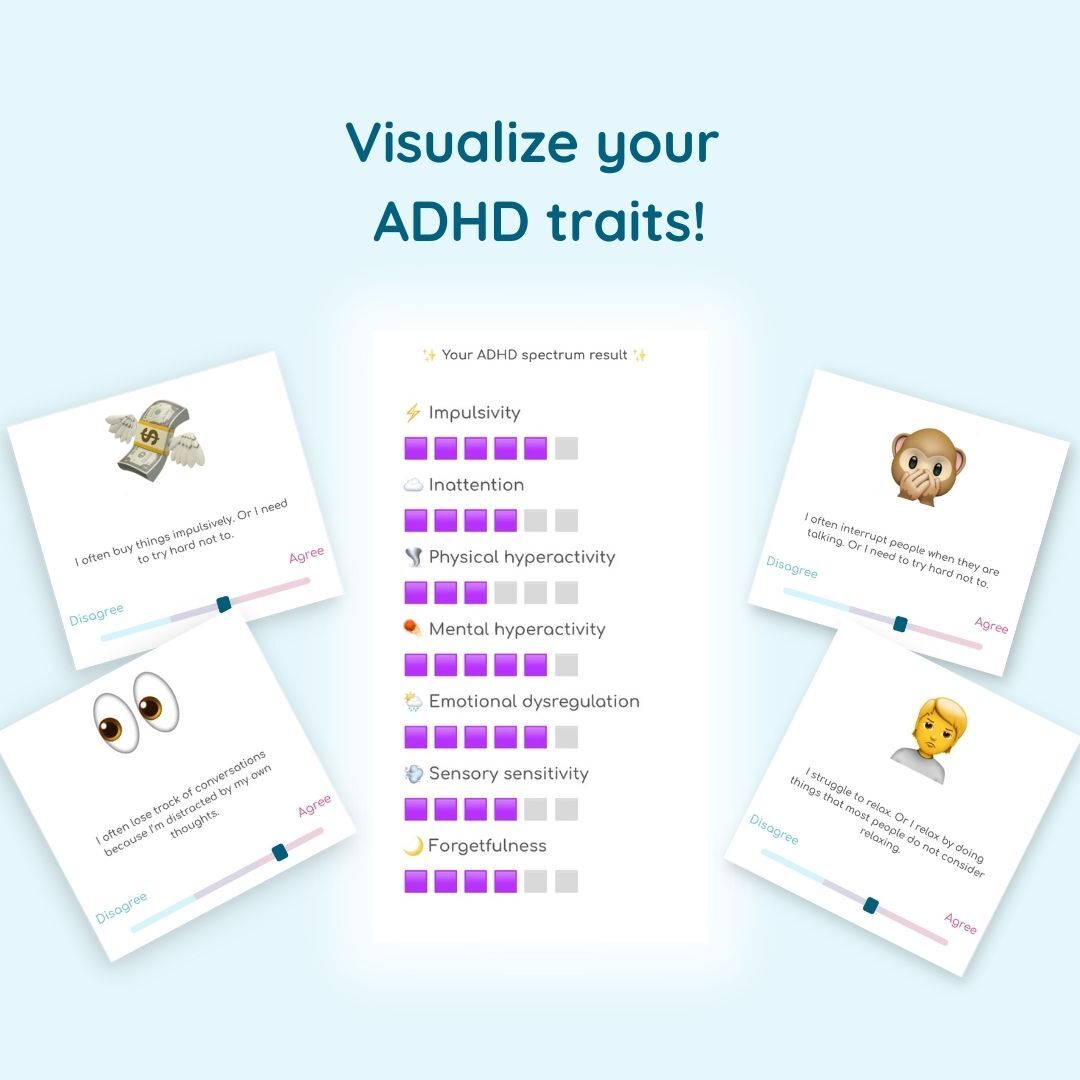Why Does ADHD Make Us Impulsive?
Ever wonder why people with ADHD often act impulsively, even when there may be negative consequences? From the spontaneous decision to quit your job to everyday moments of forgetfulness, understanding the role of impulse control (and lack of it) is essential to understanding why we do the things we do, even when they don’t always make sense.
In this article, we’ll look at the role of impulse control, and how it’s different in those with ADHD, plus:
- The neurobiological basis of ADHD impulsivity and how the brain is wired differently.
- Why some people with ADHD are more impulsive than others, and some don’t seem to be at all.
- How the different symptoms of ADHD can lead to impulsive behaviors, and how to manage it.
- The relationship between ADHD impulsivity and substance abuse.
Ready to learn about this interesting yet complex aspect of ADHD? Let’s get into it.
The Neurobiology Behind ADHD Impulsivity
Ready for a quick science lesson? 🤓
In our brains, the prefrontal cortex and basal ganglia are key areas involved in impulse control. 🧠
The prefrontal cortex, located just behind the forehead, is crucial for decision-making, planning, and suppressing impulsive responses. The basal ganglia, situated at the forebrain's base, regulate movements and make decisions based on rewards, which can influence impulsive behavior.
In individuals with Attention Deficit Hyperactivity Disorder (ADHD), the functionality and connectivity of these areas, along with their neurotransmitter activity, particularly dopamine, are different.
In other words, we're quite literally wired differently.
This neurodivergence is what can result in ADHD symptoms like impulsivity and inattention and the future consequences that come with them.
But like any ADHD symptom, and, realistically, any human behavior, experiences are different from person to person, so what if you don’t consider yourself physically impulsive?
ADHD & Impulsivity Comes in Many Shapes and Sizes
You may wonder why some people with ADHD don't exhibit impulsive behaviors, while others make impulsive decisions all the time.
That’s because a lack of impulse control, or ADHD symptoms in general, can manifest in different behaviors, affecting everyone differently.
There are, in fact, three types of ADHD.
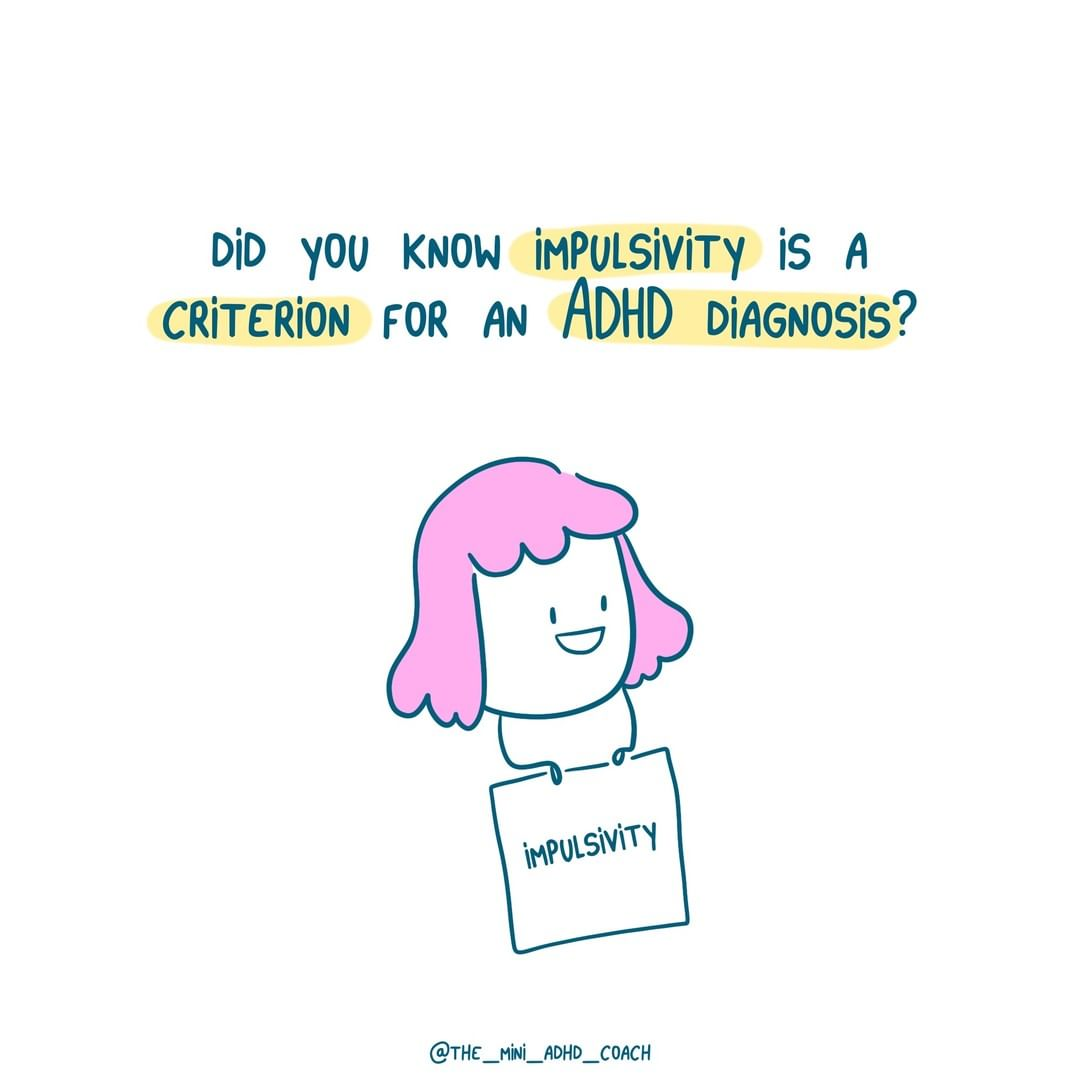
To be diagnosed with ADHD, you have to meet the criteria set by the Diagnostic and Statistical Manual for ADHD (DSM-5). Based on the criteria you meet, you’ll be categorized into one of the three types. These are:
- Hyperactive-Impulsive Type ADHD
- Inattentive Type ADHD
- Combined Type ADHD
Some people with hyperactive-impulsive ADHD are simply more likely to interrupt, while others can stay quiet during conversations and execute their impulse control well.
Those who tend to appear more ‘controlled’ often instead internalize their hyperactivity and ADHD symptoms. It can be more like an inner monologue of racing thoughts like you’re talking to yourself.
If you have combined type ADHD, you may be both impulsive and inattentive, with a tendency to forget about the details quickly. You may have difficulties focusing on tasks and get easily distracted by external stimulants.
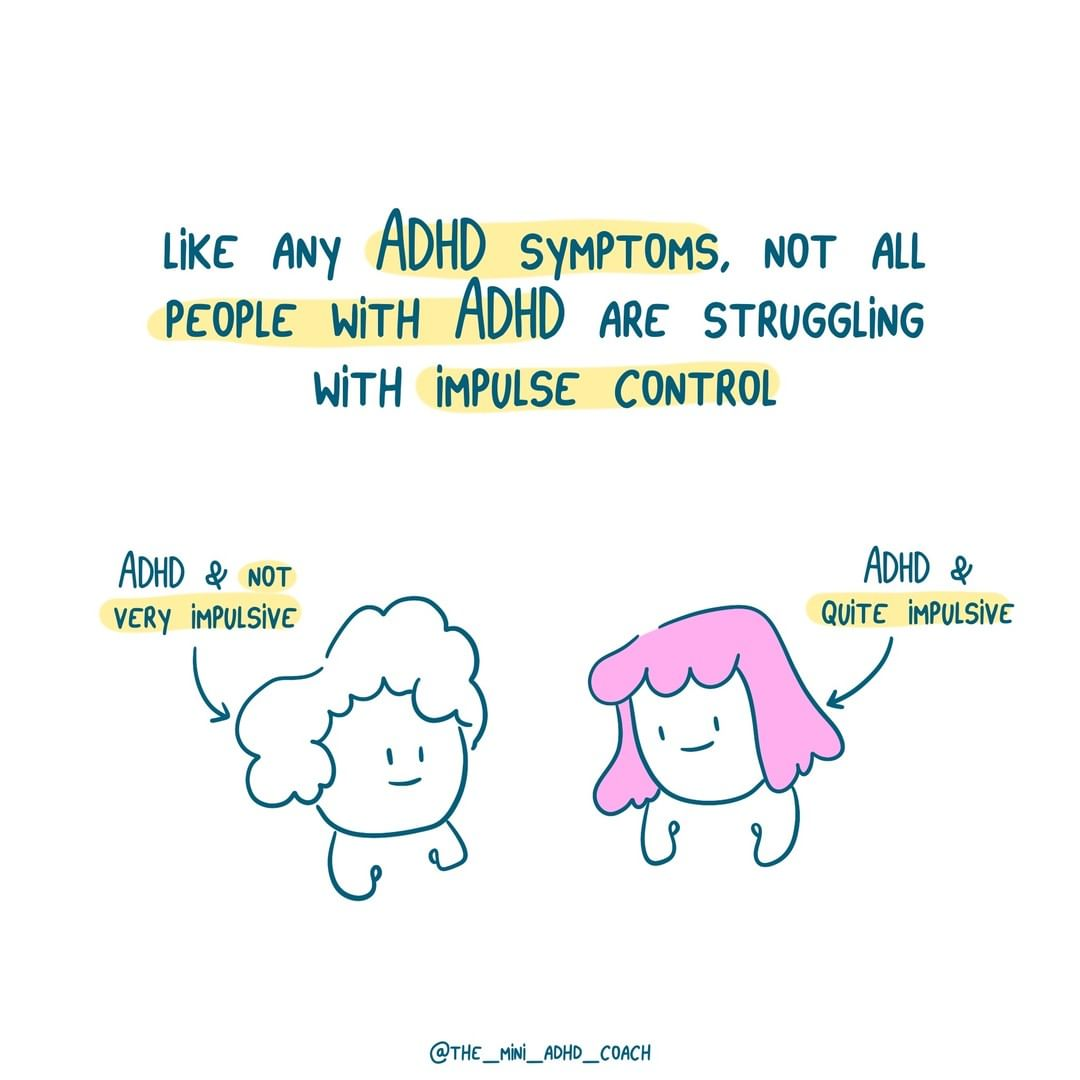
As Attention Deficit Hyperactivity Disorder influences our everyday lives, it’s essential to understand our brains and how it affects our decisions. Only then can we teach ourselves strategies to make better decisions and overcome struggles.
You Asked Us…
What does ADHD impulsivity look like?
ADHD impulsivity manifests as sudden decisions without thought, interrupting others, and difficulty waiting turns. It's a core symptom of ADHD, affecting daily life and decision-making.
Take our fun online quiz to visualize your ADHD traits and learn more about your brain!
TAKE THE FREE TEST
Real-Life Examples of Impulsive Behavior and Their Consequences
Reduced impulse control can come with many everyday challenges. This aspect of ADHD can also be one of the most damaging in the long term as it can lead to risky behaviors and impulsive actions with serious consequences.
As we mentioned earlier, this won’t be the case for everyone with hyperactive-impulsive or combined ADHD, but if you already notice a pattern of impulsive behaviors, it’s something you should actively learn to manage.
Without enough impulse control, you may tend to make decisions (both big and small) immediately and without fully thinking it through. Or, you may think it through too thoroughly and still make an impulsive decision in the end because of analysis paralysis and overthinking, which are also core symptoms of ADHD.
When these decisions turn out to be the the ‘wrong’ choice, it can lead to regrets, self-criticism, and low self-esteem. Over time, if this regularly happens, this can build and keep reinforcing a narrative of self-distrust, where we don’t trust ourselves to make decisions. If this resonates, it’s worth speaking to a mental health professional or therapist.
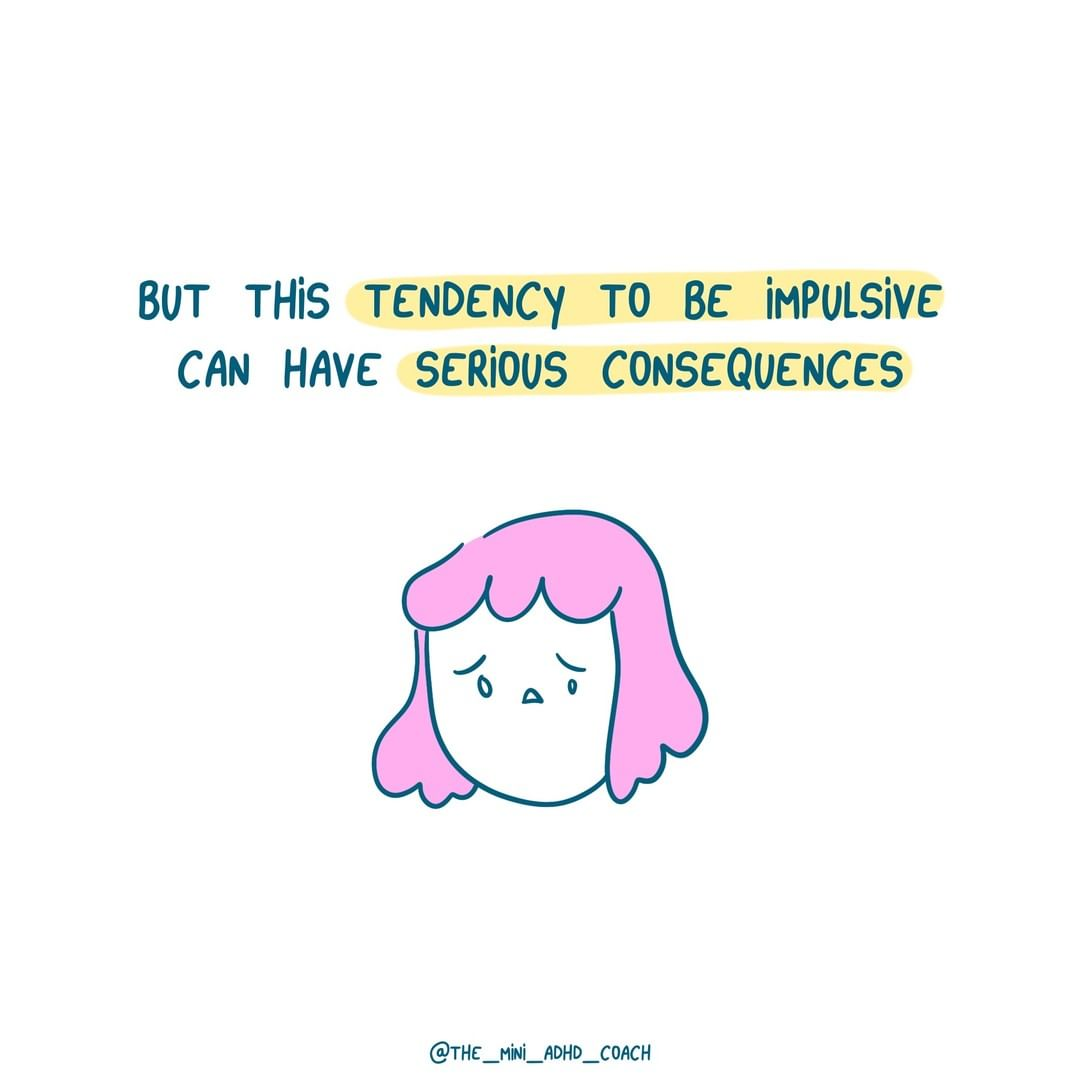
Certain impulsive behaviors can make family and friends see you as irresponsible, especially in early adulthood. This can often put a strain on your relationships. Impulsive behaviors may also make us appear clumsy, unreliable, and unlike society’s standards for what being an adult supposedly should look like - especially in women. I can’t tell you how many times I’ve been called ‘ditzy’ because of my impulsivity. 🙄
Moments of impulsivity are often caused by other symptoms of ADHD. If we want to manage it, it’s worth trying to manage the root cause first. Let’s explore a few of these…
Impulsivity & Forgetfulness
Many with ADHD are forgetful. It takes a lot of mental effort and energy to recall things, while some things just get lost. We know this about our ADHD brains, and that’s why when there’s something we don’t want to forget, we’ll get the urge to drop everything and do it immediately, to avoid it being forgotten forever (or until later).
The other day, I had a friend coming over, which gave me the motivation I needed to finally do my household chores. While cleaning the house, I suddenly remembered that I needed to change a bulb that had been on my to-do list for weeks.
Without thinking, I jumped up to change it, my hands still wet. Thankfully, my friend arrived in time to stop me before I was at risk. I couldn’t believe how silly I’d nearly been. 🙈
This is also the reason why people, especially children with ADHD, tend to blurt out answers or interrupt. The thought process behind this is that if we don’t say it now, we won’t remember it when it’s our turn to speak.
This is where to-do lists and task management come in. You want a place to capture everything that needs to be done or said, so when you feel the impulsive need to drop everything or interrupt, you can add it to the list for later instead.
Try to make sure you always have somewhere to capture notes available. This might be on your phone’s notes app, a physical notebook, or post-it notes. And, to make this even more effective, schedule time each week to review these notes and tasks.
For example, I have a ‘brain dump’ note on my phone. When I get a random idea or think of something I want or need to do, it goes on this list. It’s not a to-do-list per se; more like a dumping ground for my thoughts. Usually when I go back to it, I realize how impulsive and random that idea was, and swiftly delete it. 😆 It stops me from acting quickly on those ‘need to do it now’ thoughts.

Impulsivity & Time Blindness
Time blindness, or lack of time awareness, is why many people with Attention Deficit Hyperactivity Disorder are either regularly late, or consistently early (to overcompensate). Knowing how long things will take is difficult for those with ADHD, and getting this wrong can lead to lots of rushing around.
As anyone knows, neurodivergent or not, when you’re in a rush, you’re not careful enough. Whether that’s rushing around the house so quickly you bump into everything, knocking things over and bruising yourself, or driving carelessly to make it to an appointment on time.
But since we’re in a rush almost all the time, the risks are much higher. 😬
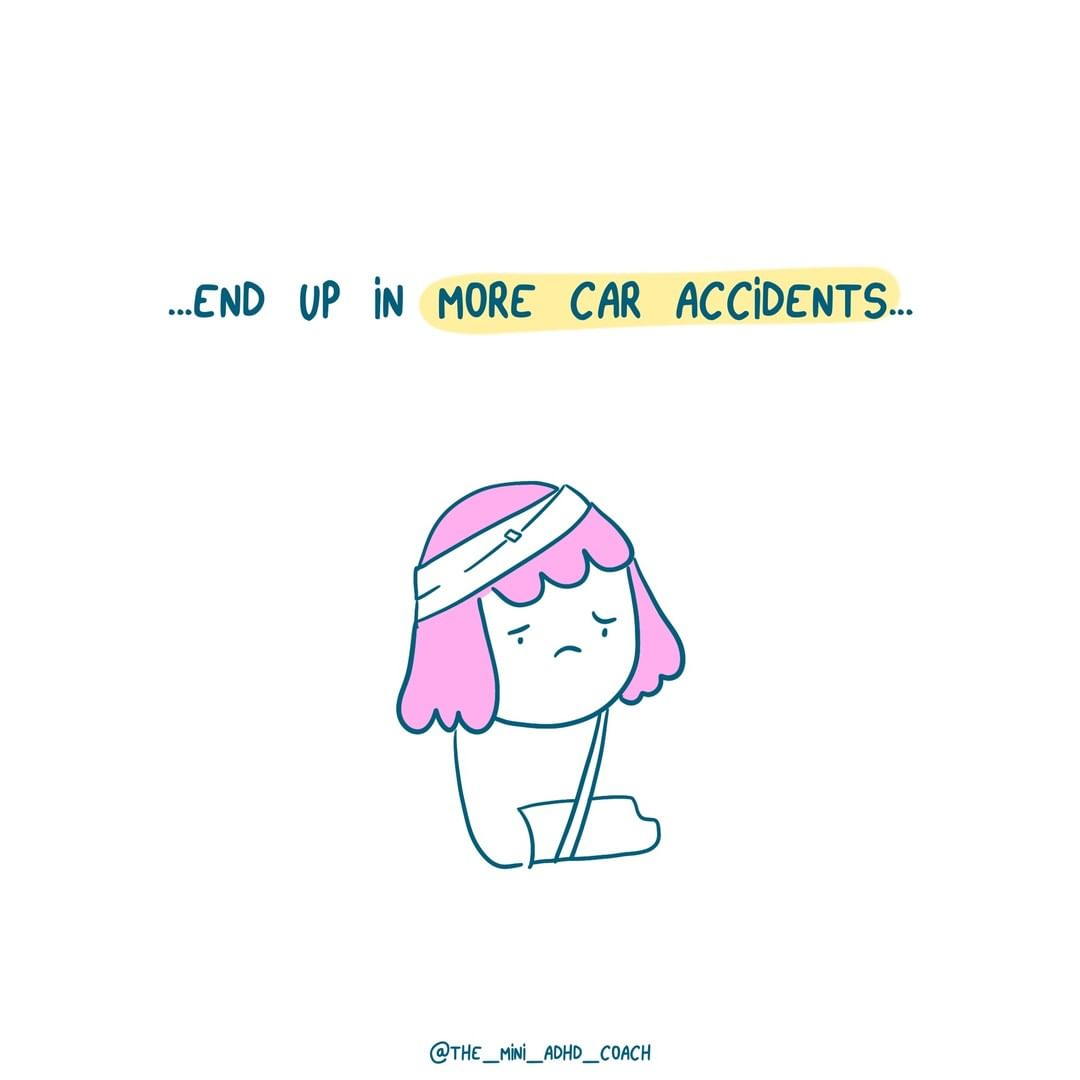
You may find you take shortcuts to save time, but end up with unintended consequences. At work, perhaps you hand in a report without fully reviewing it so you don’t miss a deadline, but a mistake results in your performance falling. Or at home, you might rush a DIY job before your partner gets home, but it ends up being unsafe.
To improve your time management skills, you can try time tracking. This involves timing and taking notes on how long your everyday tasks take you, either using an app, your calendar or writing it down. This way you have evidence of how long each task takes to refer back to, rather than guessing (and getting it wrong).
Impulsivity & Inattention
With ADHD, we’re prone to making careless and repetitive mistakes due to our hyperactive-impulsive presentation-related symptoms, particularly inattention, and becoming easily distracted.
Since our attention span and interest can be affected by Attention Deficit Hyperactivity Disorder, we’re prone to miss details, misunderstand instructions or ideas that are not adequately explained, or make a wrong decision without understanding the context.
Getting things done in general can be tough for those with ADHD. With a neurotypical brain, if there’s something that needs to be done immediately, your impulse control will ensure that you stick with it, even if it needs high concentration levels.
But without impulse control, we wander, following impulses that drag us away from our tasks, like social media distractions or other tasks.
And of course, not being able to follow through can lead to being scolded, laughed at, or even fired because of our actions (unless you already made the impulsive decision to resign). 🤷
Limiting or removing distractions is crucial if you want to get things done. And yes, I know that’s easier said than done - it’s hard.
I also find mindfulness practices like meditation and journaling to help bring me back to the present moment and the task I set out to complete.
You Asked Us…
What are 3 signs symptoms of hyperactive impulsive ADHD?
Three key symptoms of hyperactive-impulsive ADHD include constant fidgeting, excessive talking, and acting without considering consequences, challenging focus and social interactions.

Impulse Control and Substance Abuse
With Attention Deficit Hyperactivity Disorder comes a variety of other mental health problems, personality disorders and comorbid disorders. One of those is substance abuse disorder.
Impulsivity drives us to try new things, even if it’s reckless. That can include alcohol abuse, drug addiction, cigarette smoking, vaping and other substances. It can also extend to other additions like pathological gambling or risky sexual activity.
Alcohol and certain drugs already act to lower inhibitions, but coupled with a lack of impulse control, one drink and turn into many more, without that part of your brain telling you to stop.
Living with adult ADHD is difficult and means we struggle daily. We’re more likely to suffer from depression or anxiety. That’s why adults with ADHD tend to seek temporary escapes and relief to ease the burden of ADHD symptoms. But seeking these escapes too often can have negative consequences, become an addiction or lead to binges.
This is why it’s essential we build self-awareness around our patterns and find coping mechanisms for whenever we start to notice our impulsive actions becoming more frequent.
If you’re worried about excessive impulsive behaviors or experience suicidal thoughts, we recommend seeking support immediately. Behavior therapy and support groups are good options.
You may also want to explore stimulant medications. I understand this may sound counterintuitive when talking about substance abuse, but it can help for many adults. Always speak to your doctor first, they may suggest other treatments like nonstimulant drugs.
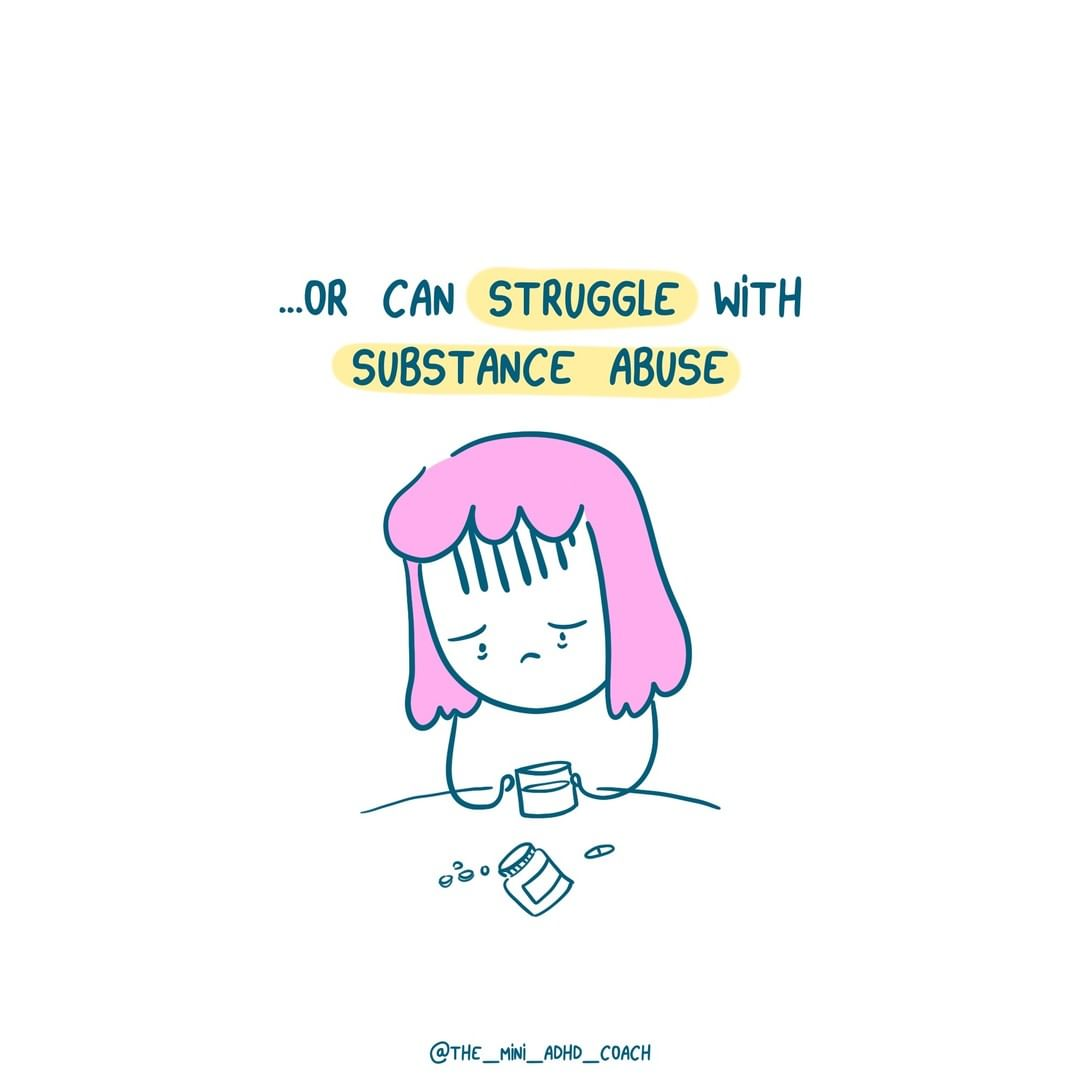
You Asked Us…
How do you fix impulsivity with ADHD?
Managing ADHD impulsivity involves behavioral strategies, medication, and lifestyle changes. Techniques include mindfulness, organizing routines, and professional support to improve self-control and focus.
A Final Note on Impulse Control
While being prone to impulsive behavior can be disruptive, and honestly, sometimes scary, there can be positives. ☺️
Sure, we may interrupt conversations sometimes, but we’re also spontaneous and creative, with a knack for solving problems. And guess what most jobs look for? Creative problem solvers. 🙋 It’s consistently one of the most sought after skills by employers.
When we’re impulsive, we can think without boundaries or limitations. Anything is possible. So when you’re the one always bringing the best new ideas to the table, no one will mind a few social faux pas.
As with any ADHD symptom, understanding how impulsivity works in our lives is essential. Having control over our behaviors helps us understand what decisions are best for us and the people around us. It makes us feel safe and in control of all areas of life.
Impulsivity may always be a part of our neurodivergent nature. But, with proper impulse control training and support from the right people, we can turn these impulsive behaviors into something more productive and meaningful. 💗
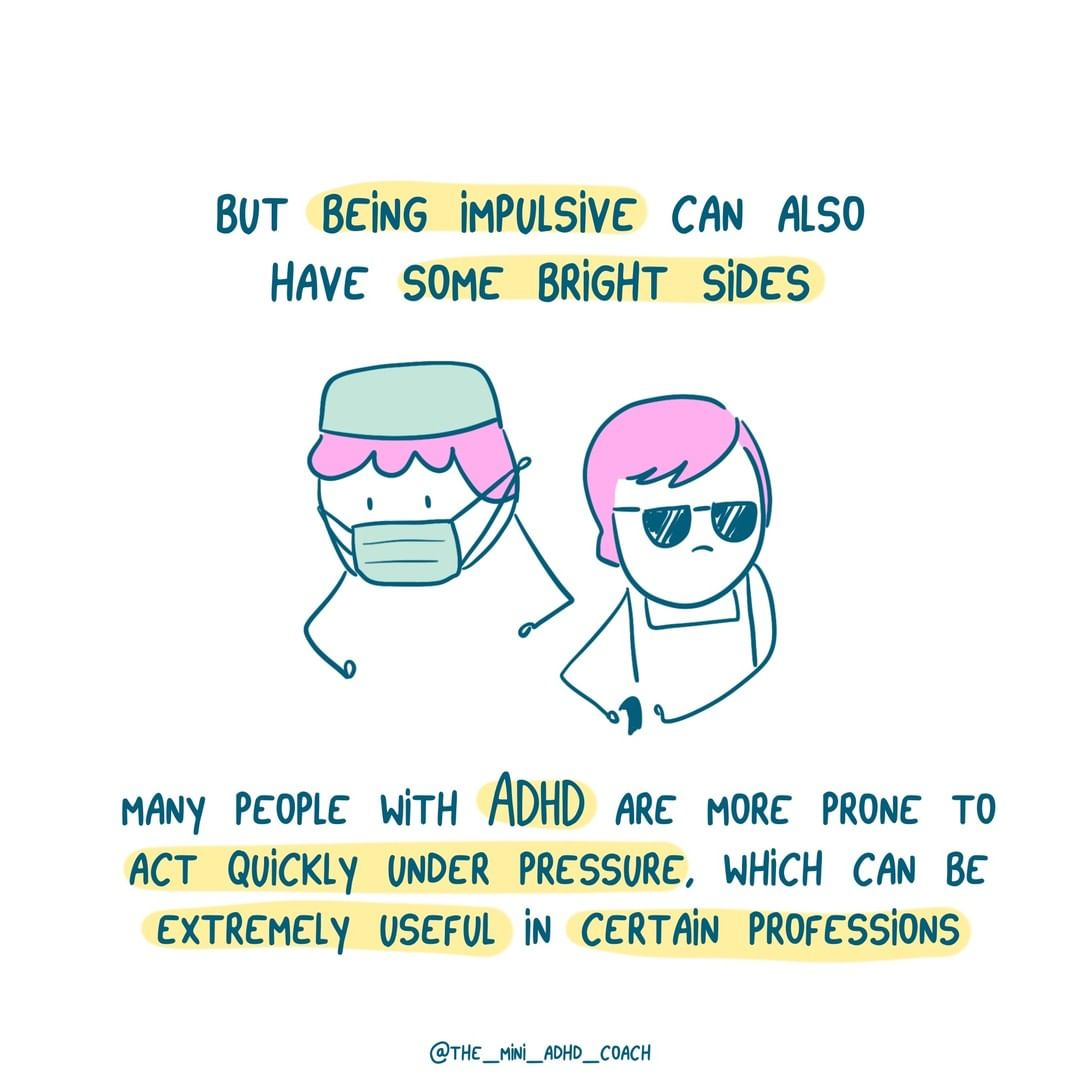
Key Takeaways
- ADHD alters brain regions responsible for impulse control, leading to varied decision-making processes, impulsivity and inattention.
- Impulsivity manifests differently among individuals with ADHD, requiring tailored management strategies.
- Impulsive behaviors can lead to everyday challenges and negative outcomes in various aspects of life, such as forgetfulness and time blindness, which can result in accidents and strained relationships.
- ADHD impulsivity correlates with an increased risk of substance abuse and addiction, highlighting the importance of seeking support and therapy.
But remember, while impulsivity can pose challenges, seeking support for impulse control and learning to work with it, not against it, can lead to more positive outcomes and fulfilling lives.
What’s Next?
If impulsivity is one of your biggest ADHD challenges, we recommend you read these articles to learn how to manage it:
Mastering Spontaneous Shopping: Control Your Impulse Purchases & Save Money
Visualize and assess 25 ADHD traits and understand how they affect your life.
Learn more
Frequently Asked Questions (FAQs)
Does ADHD affect impulse control?
Attention Deficit Hyperactivity Disorder (ADHD) affects people in different ways, but yes, many people with this neurodivergent condition have challenges in their impulse control. Impulsivity denotes one of the core types of ADHD (hyperactive-impulsive type).
What are the signs of ADHD impulsivity?
Signs of ADHD impulsivity include making hasty decisions without considering consequences, difficulty waiting for turns or interrupting others, and acting on sudden urges or impulses without thinking things through.
Can adults with ADHD control their impulses?
While adults with ADHD may struggle with impulse control, they can learn strategies to manage impulsivity effectively through therapy, medication, and lifestyle adjustments. It's a lifelong journey of self-awareness and skill-building, but a better quality of life is possible with the right support and guidance.




